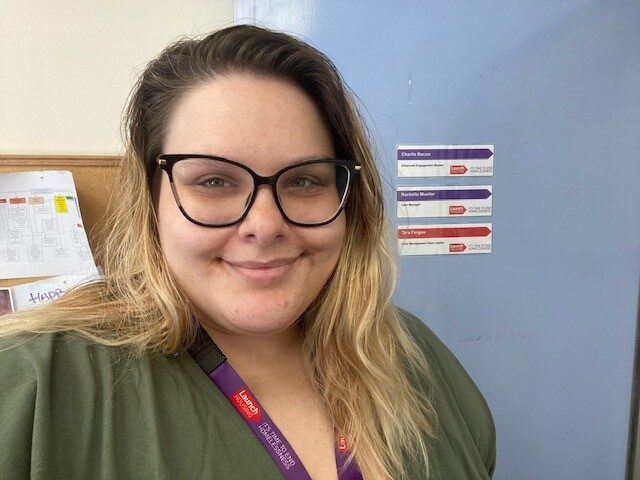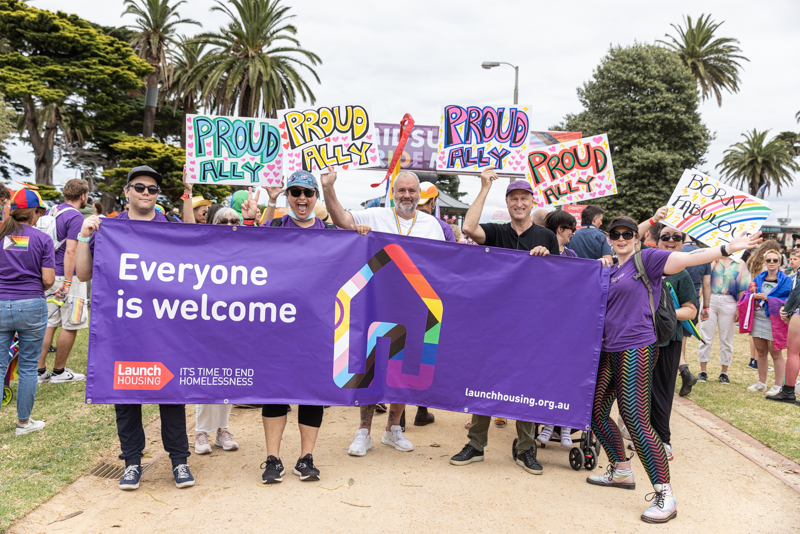Providing better support for our queer community
Tara Fergus – Team Leader Launch Housing Southbank
I’m Tara and I’m a team leader at Launch Housing Southbank. I’ve been at Launch Housing for about five years now and working in the community mental health and housing sector for about seven years all together. My work here is a mix of direct client work and supporting, mentoring, and coaching the case managers here as their supervisor.
This Melbourne Pride, I’ve thought a lot about how my identify has informed my approach to providing a better service for LGBTQIA+ people experiencing homelessness.

From a young age, even before identifying as a bi/queer woman I’ve always had an interest and empathy for the LGBTQIA+ community, which looking back was probably a big sign that I was a member of the community even before I admitted it to myself. Living in a heteronormative society that questions if bisexuality truly exists will do that. To me, using my own lived experience to understand how to work with a person who may share a similar identity or have had similar experiences is invaluable. There are obviously many factors that can vary between individuals and the LGBTIQ+ community is not a monoculture, but there is often a common thread or feeling of camaraderie because we understand what it is to feel out of place or ‘othered’ by society. This shared experience is important.
This was especially notable to me several years ago at a previous organisation when I worked with a client at who was in her late fifties and identified as a trans woman.
She wanted to get on hormones and start her medical transition but didn’t know how to go about it because the worker she had before me wasn’t very educated in working with trans people. They saw someone who read as ‘male’ to them and despite her identifying transition as a goal, she was continually misgendered and dead named by her worker. Dead naming is when a trans person’s name given at birth is used instead of their chosen name. It’s inappropriate and can contribute to suicidal ideation, something trans people are at a significantly higher risk of than cisgender folks.
When I stepped in as her new case manager, I wasn’t hesitant to ask her about her pronouns or what name she wanted me to use because I’d had the training and I knew how to navigate the different services. It was such a simple conversation to have because I had informed myself.
I was able to connect her with services like Equinox, a great GP service in Fitzroy that works with trans people a lot and it turned out to be the support she needed. When I left that job, my client was seeing a psychologist, had a great GP, was on hormones and was happy. She was in the process of changing her name officially and I don’t think anything would have made her turn back at that point.
There are so many reasons why someone might become homeless, and these reasons are often interconnected. For the LGBTQIA+ community, there’s often an additional layer of trauma and ostracization that adds to people’s vulnerability.
I think particularly for trans and gender diverse people, there is a lot of really damaging rhetoric out in the public sphere and it influences how people think about and treat people.
For people dealing with this backlash from the world because of their identity, it can lead to so many issues because they’re trying to cope with it. It can trigger mental health issues or alcohol and other drug (AOD) reliance – and mental health concerns and AOD use can be symptomatic of one another. All of these things can lead to not being able to work, not being able to pay rent, and sometimes ending up in homelessness.
We do see a lot of trans people who have just been ostracised from family when they’ve come out later in life particularly, and their kids have rejected them as well as ex-partners, and they just don’t have any other family.

For queer identifying people, community is so important because we have a history of creating found families.
Without family or community support, everything becomes more difficult, including recovering from mental health issues. People fall through the cracks in the system when they don’t have people looking out for them.
I think people have the view that homelessness is an individual’s fault but having worked in this sector for quite some time I can see it really isn’t. It’s a societal failing and ultimately a result of trauma. We have failed people on one level or another and I think that always comes back to us, to the politicians that we vote for, and the way that we think people should be treated.
Housing options are also a major issue, as the waitlist for self-contained properties is often years long. We need more support services, affordable housing, and changes to welfare to help those who have fallen through the cracks.
In terms of the services we provide people, there’s so much importance in having a diverse array of people as part of our staff.
When I’m helping with recruitment, I always think about this. It’s not about looking at diversity in a tokenistic way – it’s about seeing how diversity can enrich our services and service delivery and inform us. I’m proud that at Launch Housing Southbank we make sure to commemorate important dates on the calendar such as Pride and Transgender Day of Visibility, and use reflective practice and group consults to improve our service delivery for our diverse client group.
I think sometimes people feel like LGBTQIA+ issues or support needs is not their ‘area’ if they don’t identify as part of the community but it’s okay to be curious and take it upon yourself to learn more. You don’t need to be the expert, and there is plenty of information and training available.
Those of us who work at Launch Housing or in community services do so because we’re interested in people, we’re interested in helping people. Being a better ally is about taking an interest, really by educating yourself and not waiting for someone else to take the lead. That’s how we can better support all people, all identities, on their journey out of homelessness.
